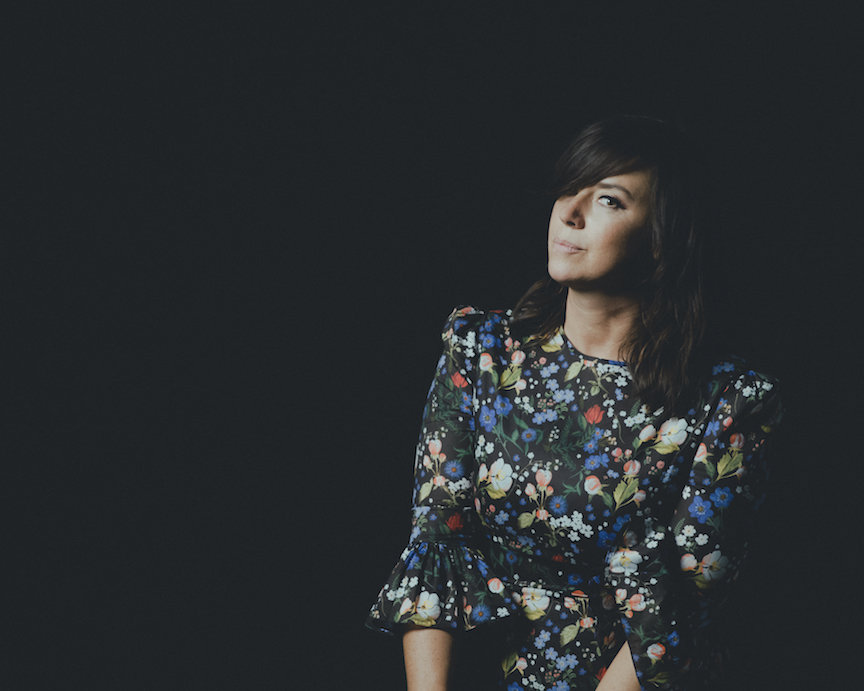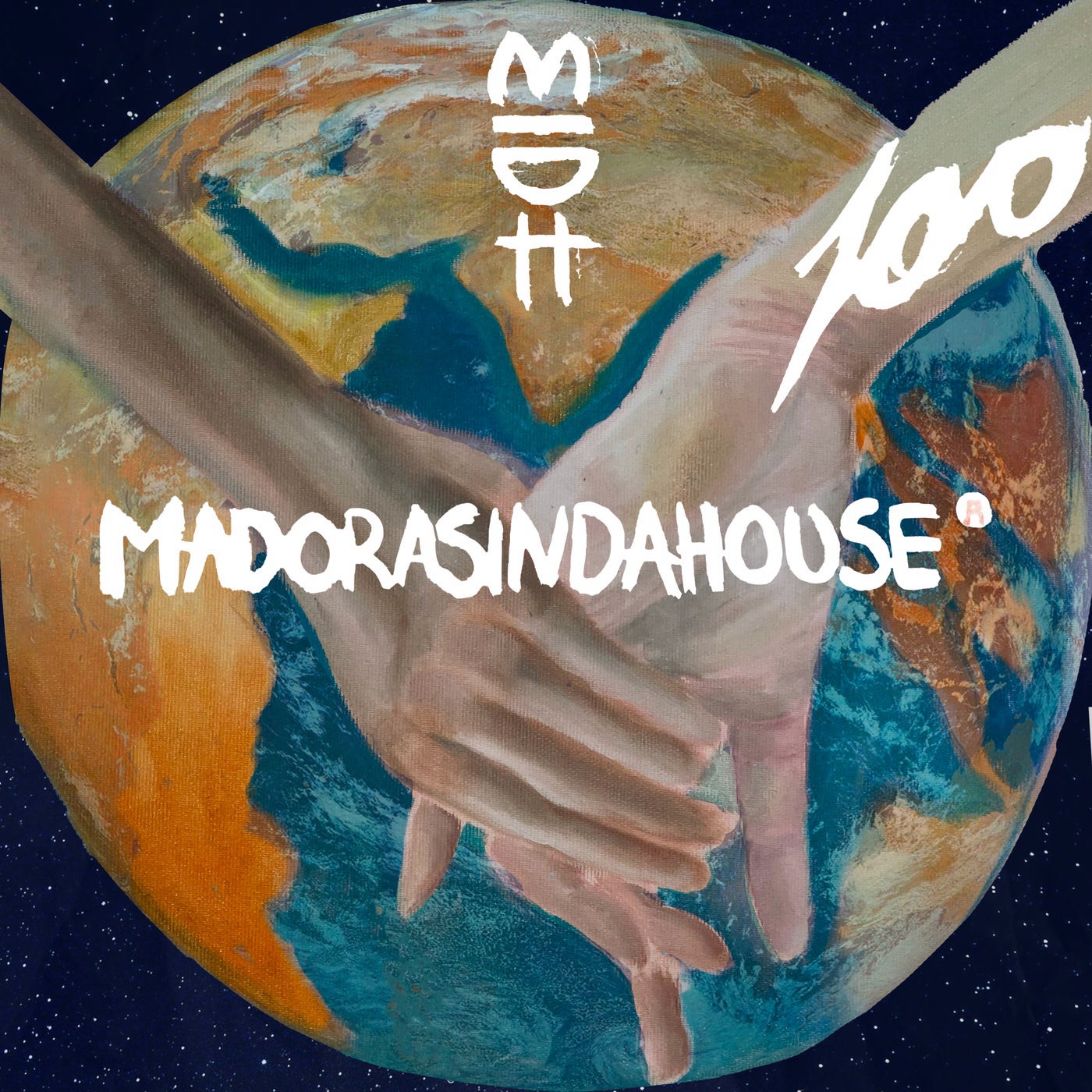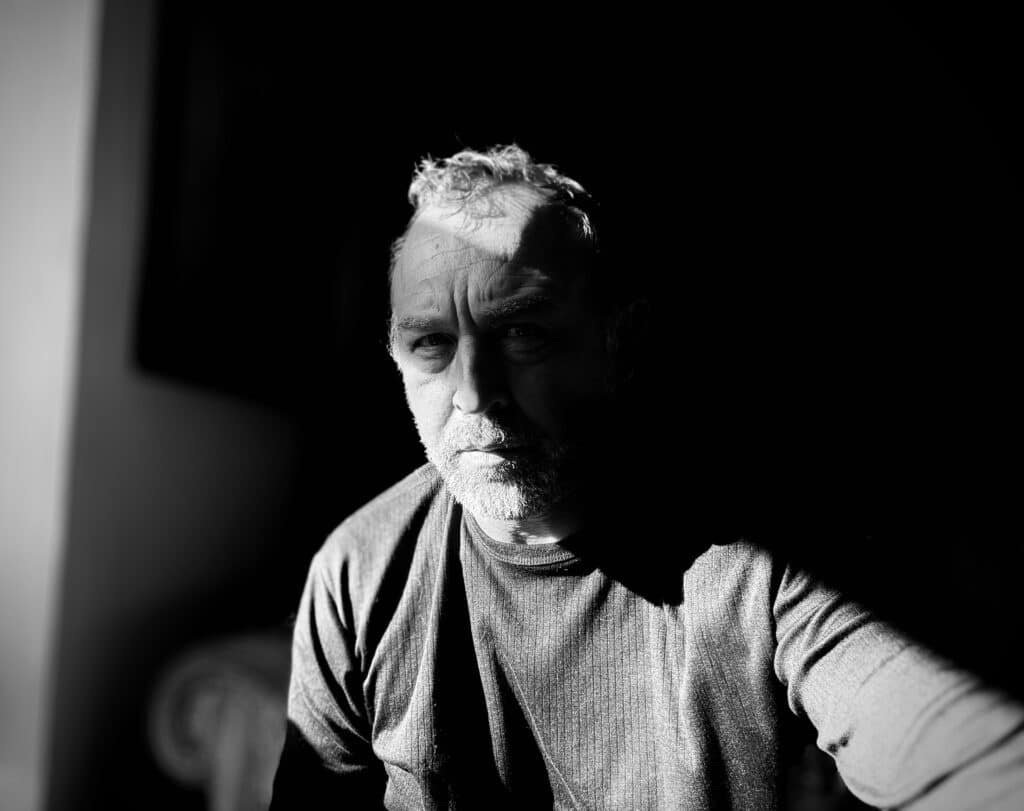

Lead photo by Shayla Loewen
For a while, Leith Ross was known as the person who posted gut wrenching acoustic original snippets online.
Anything coming from the Ottawa-born performer was (and still is) guaranteed to hit like an arrow to the heart, both in euphoria and in sadness and in all-encompassing love and everything in between. Coming up in the pandemic-era Internet, Ross – who uses they/them pronouns – became recognised as a modern Romantic poet of sorts. In this way, not much about them has changed across the several projects they’ve released since going viral in 2021. But as the 27-year-old Ross welcomes their second LP, I Can See The Future, they have assumed full form, blossoming beyond a “bedroom lyricist” origin story into a mature artist of their own making.
Despite being one of the buzziest artists in the indie-folk scene, Ross has been quarterbacking their career for the past few years from Winnipeg, Canada, travelling when necessary for recording or shows. They have no plans to leave.
On the morning of our chat, I’m reach Ross in their cozy Winnipeg living room, as they soak up the last of summer in the Prairies. “I never wanted to end up in a big city because I’m not used to it, and I just don’t like it as much,” Ross explains. “I grew up in the middle of nowhere, outside of Ottawa, so I was used to quiet life and being able to hear myself think. And I’m very attached to that.”
Get the Best Fit take on the week in music direct to your inbox every Friday
Moving to Winnipeg was, as they say, a very conscious decision. “It’s kind of like a bubble,” they laugh. “When I’m here, no one really cares. No one really knows. And I just go about my normal life. It feels a lot like what my life used to feel like, and then when I’m on the road or in specific spaces or when I was spending a lot of time in L.A., then I’m very aware of what my job is.”
Ross has been making music their entire life, but they got a formal start in Toronto at Humber College’s jazz music program. The original idea was to make the rounds in Canada’s cultural capital, doing gigs and meeting people and cutting their teeth – but in an entirely unpredictable twist of fate, and Ross's very first gig under their own name at the Burdock — a key indie venue in Toronto — was on 13 March 13 2020, the night before the nation shut down.

After that, Ross went back home for two years to live with their parents and entirely accidentally started their career online. “I think the fact that that happened is what had allowed me to make this choice,” Ross says of their beginnings. “It was always going to be that I did the thing, stayed in the big city, tried to make it in music … But I just got really lucky and was able to make that decision at the beginning of my career instead of having to do the 10 to 15 years before.”
Coming to Winnipeg was a middle ground of sorts too. In 2020, just as Ross was wrapping up at Humber, they connected to Canadian alternative music icons the Landreth brothers, who helped them release their very first EP, Motherwell. The brothers themselves are based out of Winnipeg, and brought Ross out to Manitoba to play the Harvest Moon festival. “There was not a lot of music industry, so there was no competition, which sometimes plagues the Toronto scene and makes me sad,” Ross says of their first impressions of Winnipeg. “And I thought it was beautiful. I love the Prairies. And then I asked my friend how much they paid in rent, and I was like, oh, well, okay. So, I flew back home, bought my first car, put all my earthly belongings in it, and then drove back up.”
The move to Winnipeg is, in a way, very representative of what Ross and their art is all about, motivated by community over commodities – themes that appear across all of their writing, whether those be love songs or songs about the state of the world. And it’s that search for community and understanding that sits at the heart of I Can See The Future too.
In Ross’s writing, the minute and mundane sit hand in hand with world-altering philosophical revelations. It addresses how best to show up for both born and found family, how to love well, and how to leave the world better than we found it. Some of these ideas have their roots in political advocacy but in Ross’s hands read as tenderly universal and human. Considering the big picture comes naturally. To their credit, it was almost baked into their DNA. “My Dad — he’s retired now — but he was a philosophy, ethics, English, and world religions teacher for high school. And he brought that vibe home,” Ross laughs and explains. “My whole life was like, you know, the big questions all the time. Like, ten years old, we were talking about the meaning of life around the dinner table. My parents were always encouraging us to have an open mind and teaching us so much about the world.”
“As far as themes, I kind of wonder if I will be stuck writing about the same things my whole life,” Ross admits. “I always feel like half the record is about me and my interpersonal relationships and half is about the world and how I fit into it.”
The title track of I Can See The Future, for example, situates itself in the vantage point of someone living several hundred years from now. Or, as Ross specifies, however long it takes for the world to be okay. In the song, Ross sees their dream for a better life for all played out. It was a mission statement of what they want their work to represent: optimism and hope and so it felt only natural to choose it as both the closer and the album’s title. “Conceptually, it’s the beating heart of this record,” Ross says. “It refers to this depth of understanding about the world that then allows you to believe that the world is good or will be good. And, maybe, that belief extends to you as an individual knowing that you are doing your best and that you deserve to live and continue to try to do your best.”
Sonically, though, I Can See The Future is profoundly different from anything Ross has done before, pulling from a wider, more electronic palette that brings them into a decidedly new era of their artistry. With the Landreth brothers, Ross’s former producers and main partners on their first record To Learn, they recorded mainly acoustically with guitars and other instruments. With Rostam Batmanglij at the helm this time, Ross began exploring what their sound could look like beyond those boundaries, blending electronic embellishments with their singer-songwriter sensibilities. “Rostam just has such a catalogue — even in his studio, he has like six million instruments — and has such an ability to bring things to life in a way that I had always dreamed of them being,” Ross says.
“It’s a pretty good summary of all the things that I’ve been interested in making and concepts that I’ve been talking about, both in my life and music, for years,” they continue. But they’re careful to avoid any specific references, noting instead that the record just feels like a culmination of the things they’ve loved, almost a patchwork of homages for every form of music that’s shaped a portion of their life in some way. There’s a nod to jazz standards, a small reference to Ross’s background as a student in Humber’s jazz program. There are also key references to Celtic folk, a nod to Ross’s Scottish heritage. On top of that, there are hints of R&B, 90s vocal pop production, indie folk, country, and more.

The work with Batmanglij began over a year ago, with a studio session that served as a kind of meet-cute. The busyness of the first album cycle and tour had largely wrapped up, and Ross was able to recuperate and prepare themselves to go through the motions again. “I’m someone who’s always writing," they explain, "so I never have that piece of feeling like I don’t have enough material. It’s more just asking myself if I’m emotionally and physically willing to be traveling and spending long days in the studio and stuff."
Shortly after that first day with Batmanglij, Ross got Covid, putting things on pause and the break was delayed further by Batmanglij's own insane schedule. Things officially picked up again last summer, and from there, it was kismet. “I’m pretty picky about who I work with, only because I can be quite socially anxious, and when I’m socially anxious, I get in my head and then I just start overthinking every decision I make and it’s a bit of a disaster,” they admit. “But when we met and hung out and did our one first session, primarily, we just went on this really long walk and became friends. Then, I felt like it would be possible.”
What propelled I Can See The Future forward, Ross says, was a strong bond of mutual trust between the pair of them. By becoming fast friends, Batmanglij and Ross were able to challenge each other creatively in a way that ultimately helped elevate the music.
Having this record be the most creatively diverse project Ross has released is, they say, both liberating and daunting at the same time. Coming up online and having a very online audience can have its pros and cons to that end. When an artist like Ross gets pegged as the “acoustic TikTok kid,” the label can stick in a manner that proves creatively detrimental. If Ross shares an acoustic snippet of a song they’re working on online, for example, there are bound to be fans complaining in the comments when the fully produced version has more to it than just vocals and acoustic guitars.
“I do deal with it a lot, and it’s very frustrating,” Ross admits. “As a society, I think we’ve sort of taken music for granted with how accessible it is.” They point out that in almost no other era would audiences be aware of what the demo of a song sounded like before hearing its final version. “Almost no one, when they’re a songwriter, unless they’re writing a true to form old folk or country tune, is writing a song on their one instrument and picturing it staying solely on that one instrument. And, especially for this record, I certainly was not. All these songs were being pictured as big songs when I was writing them.”
Still, Ross says they understand and empathise. They still love the pure acoustic side of their art, and they’ll likely always try to include it in some way, perhaps through acoustic sessions or leaked demos. “But, I hope that the record will be good enough and interesting enough to dissuade from the grieving of the acoustic versions. And there are a couple that pay homage to the TikTok form,” they joke.

And if those types of comments are the main consequence of Internet-era music discovery, Ross still says they wouldn’t go back. They’re more than appreciative of the audience they’ve built and those that have stuck around to support their records. After all, the Internet was the very tool that allowed them to connect with people in the first place. It’s also, they note, a tool that’s allowed so many artists like themselves to carve a path where they might not have before.
“I’m not really a person who feels, for example, very passionately that streaming is a bad thing necessarily. I think the issue is that no one’s being paid correctly,” Ross explains. “I like that being a musician is more accessible, because obviously when there were all these barriers that were imposed by labels where you couldn’t have a career unless you got ‘discovered,’ there were so many people who deserved their shot who wouldn’t have gotten it. So, I like that music has become more democratic and that people can kind of decide now who they want to become a famous musician.”
Ross considers themselves one of the lucky ones who was given that platform yet they still often wonder about the ways they want to use it — and how far they want it to go: “I don’t really feel desperate for it to, like, blow up or anything. I also have caught myself then just wanting it to be kind of lowkey. But then I’m like, no, I should give this album its chance and do the things and go on the press trip. This is my job. It’s always complicated."
Regardless, they’ve been pleasantly surprised by the number of people tuning in for the singles and videos this time around. It’s been both strange and exciting. “I’m super happy with my level,” they continue. “It’s always, like why do I want to make money? Well, so that I’m stable and don’t have to stress about financial stuff, I can pay my bills, I can pay my taxes. I feel like that’s why everyone wants money. And then it’s like, okay, well, do I want fame and money past that point for any legitimate reason? Or, do I just want it because it’s kind of the hot commodity of our society,” Ross asks. “I’m just always trying to keep myself in check about that, because I care about it. I don’t ever want to get lost in the sauce and make that my priority when it should be making music.”

 1 month ago
18
1 month ago
18


















 English (US) ·
English (US) ·